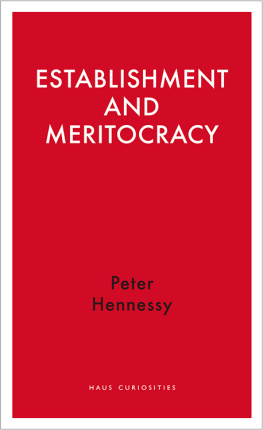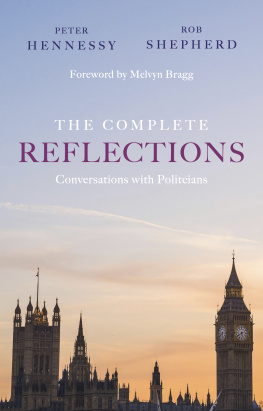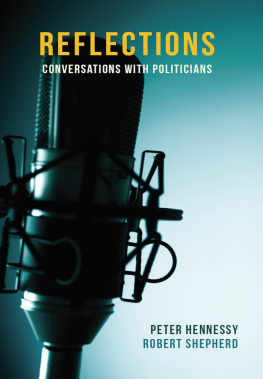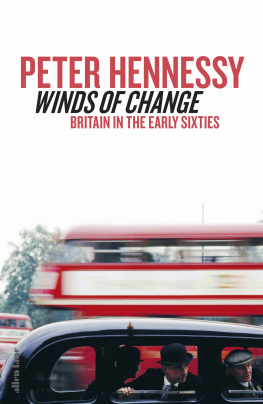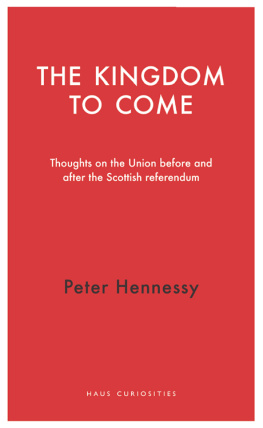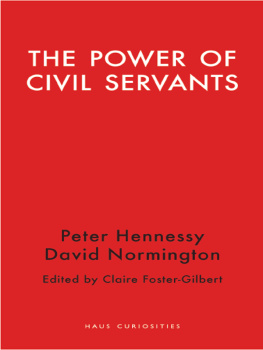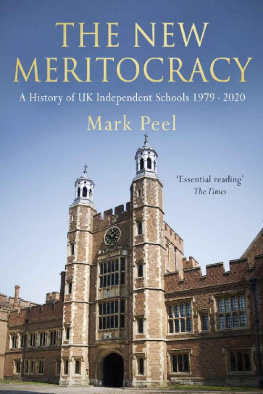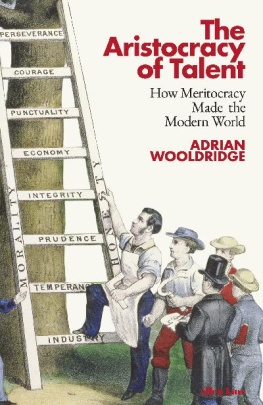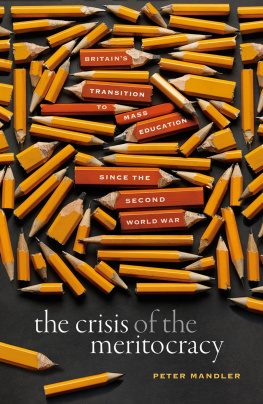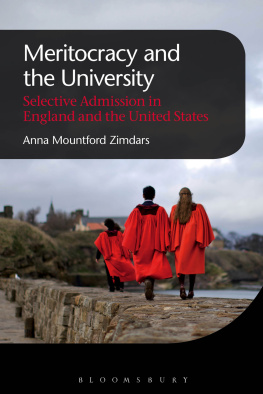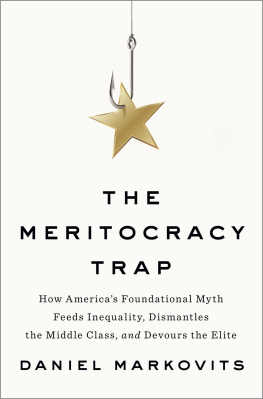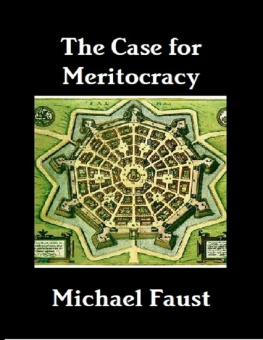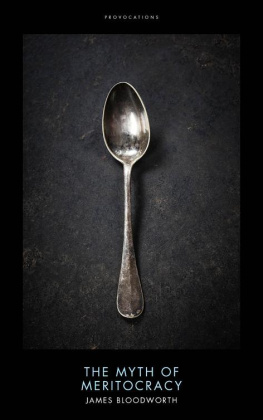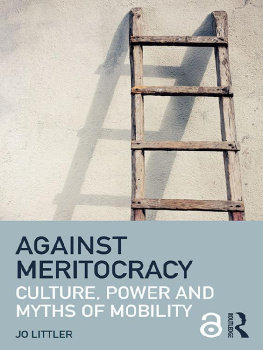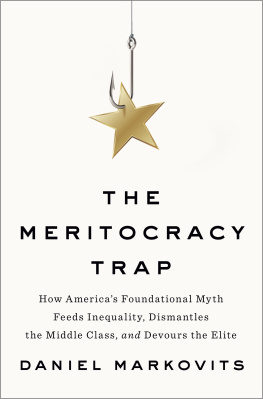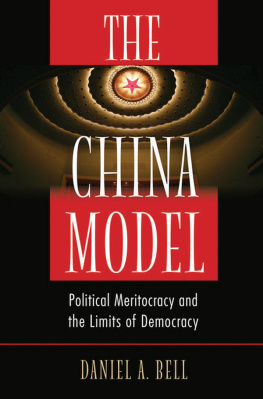In memory of Michael Foot
19192012
Historian, soldier, friend, mentor
and connoisseur of secret establishments
About the Author
Peter Hennessy is Attlee Professor of Contemporary British History at Queen Mary, University of London. He was educated at Marling School, Stroud; St Johns College, Cambridge; the London School of Economics and Harvard (where he was a Kennedy Scholar 197172). He spent 20 years in journalism with spells on The Times, the Financial Times and The Economist and as a presenter of the BBC Radio 4 Analysis programme. He is a Fellow of the British Academy and sits as an independent crossbench peer in the House of Lords as Lord Hennessy of Nympsfield.
Peter Hennessy
ESTABLISHMENT AND MERITOCRACY
Prologue
There were multiple triggers for this pamphlet. First, my long and much valued friendship with Barbara Schwepcke of Haus Publishing. Second, our conversation during the Haus 10th anniversary dinner at the Reform Club in London on 16 February 2013. That night Barbara and I regretted the passing, outside the think tank world, of pamphlets on topical themes which was so powerful a strand of politico-literary life in the interwar years especially within the yellow-orange covers of Victor Gollanczs celebrated Left Book Club (though the Gollancz oeuvre was usually rather bigger than pamphlets). The idea of the Haus Curiosities a homage to Einsteins great dictum Never lose a holy curiosity developed from that evening at the Reform and in November 2013 over lunch in the House of Lords the deal was struck whereby I am now putting pen to paper on Haus Curiosity N0.1.
In the meantime there had been other triggers for this squib which did not always involve lunching or dining in Establishment service stations of various kinds though an after dinner speech on The Establishment to the benchers of the Middle Temple in May 2013 was certainly one of them. In the autumn of 2013 I delivered further thoughts on The British Establishment to the Inside Out Festival at the Royal Society of Arts and a lecture on Meritocracy Revisited, the theme of the Michael Young Family and Kinship Memorial Lecture 2013 which I was invited to deliver by Grandparents Plus at the Royal Society of Medicine. In January 2014 I spoke, too, at the Harkness Fellows Annual Dinner on The Idea of a British Establishment. I was fortunate also to be invited by the Lord Mayor of London, Roger Gifford, to take part in his symposium on The Authority of Institutions: Symbolism and Change at the Mansion House in October 2013.
I was very grateful to the Middle Temple, the Inside Out Festival, Grandparents Plus and the Harkness Fellows for their combined stimuli to revisit the interlocking themes of Establishment and Meritocracy. Revisit was the right verb because such speculations had intrigued me over several decades. For they were and are very much a part of the intellectual compost that made my generation of young postwar Brits who were good at exams. The Establishment notion and the concept of a spreading, growing and eventually self-propelling meritocracy was bound to intrigue people like me who benefitted mightily from climbing the postwar ladders of opportunity. What, for example, were state and local authority funded grants to an expanding number of students designed to do? It was plain enough. To get the young and gifted into higher education whatever the socio-economic position of their parents. What were universities for if not to enable a meritocracy to rise?
Anatomising and analysing the twin themes of Establishment and Meritocracy is a huge undertaking that deserves a big book. This volume is not it. It is not even an executive summary-style surrogate for the big book. Its more the thoughts I would offer the brave young social and political historian if he or she came to see me for a chat before setting out on the stretching task of mapping and analysing these most potent yet highly elusive phenomena.
Peter Hennessy
Walthamstow, Westminster, Sheffield and
South Ronaldsay, April 2014
The Twin Themes
Our very British preoccupation, generation after generation, with the idea of an Establishment suggests that within a good number of us there lurks an amateur social anthropologist fuelled by an ancient urge clothed in modern form to divine who are the elders of the tribes and the institutions that matter to us. The professional anthropologist, Mary Douglas, caught something of this in her How Institutions Think when she observed that writing about cooperation and solidarity means writing at the same time about rejection and mistrust.
Here we find one of the crossover points to the concept of meritocracy. For the preoccupation with merit, I think, is linked to this the wish, the almost indignant expectation that those who make it into the Establishment enclosure are propelled there by their abilities and powers of application rather than shimmering in thanks to birth or social connection. Establishments are irritating enough to those who feel excluded or patronised by them without the unmeritorious blagging or breeding their way into their ranks. As a result the notion of Establishment will always be twinned with the concept of meritocracy not least perhaps because in many peoples eyes merit tempers privilege. The same applies to the honours system, a phenomenon which needs at least a pamphlet to capture its contemporary cartography and the degree to which it reflects Britain in the 2010s. Its intriguing, for example, to note that at the very apex of the honours system there sits the lustrous Order of Merit. It was founded by Edward VII in 1902. Its numbers are restricted to 24 and appointments are made personally by the Monarch.
Perhaps the best way to imagine the twinned themes is as a pair of trains running on parallel tracks throughout postwar society taking on extra passengers and baggage by the decade. One of the reasons both the Establishment and the Meritocracy expresses have fascinated me is that, to some extent, I have been a passenger on both. And one of the more compelling aspects of writing the history of ones own times is that desire to make sense of its autobiographical elements.
Over the four decades of which I have been conscious of them, I have carried in my mind a certain idea of the pair. Meritocracy is the clearer of the two the notion that the gifted and the energetic rise in terms of professions and rewards (in terms of both salary and wider status) on the basis of demonstrable merit whatever the social and financial positions of their families rather than because of inherited wealth or family connections.
Establishment is fuzzier a phantom army of the great and good who fill positions in public, cultural and intellectual life exercising a special kind of subtle, supple, concealed soft power within our institutions and our society. Its members can set the tone, influence the direction of public policy and exert considerable sway over future appointments to the professions within which they have risen. Yet plenty of successful people would be appalled to think they were Establishment figures. It is not a label for flaunting. Indeed many would define themselves against it. Though quite often they quietly slip inside it during their middle and later years while remaining determined not to succumb to its state-of-mind, which is itself the mistiest of concepts.
Despite this myriad of ethereal qualities, the Establishment has brought much joy and humour as the perfect tethered goat for satirists. This has been particularly true since the early 1960s when that genius among satirists, Peter Cook, founded The Establishment Club in Soho for the purposes of nightly lampooning amidst the rich opportunities presented by the Conservative government of Harold Macmillan as it proceeded to decay like a ripe stilton.

